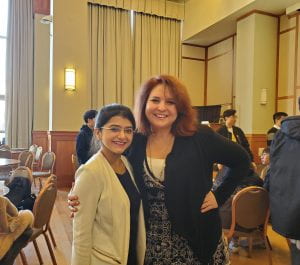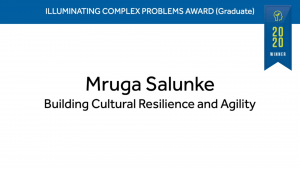Am I Resilient?!
Starting in March of 2020, I have been consuming an overwhelming amount of online content in an attempt to track the labyrinth of chaos we are facing in our world today. While writing this piece, there were times that I felt paralyzed and unable to bring my words to light.

Professor Patty Goodman and myself at the Global Pathways Student Conference 2019
My struggle was mitigated when Professor Patty shared her observation of my recent educational experiences. She described it as a Journey of Resilience. I had never thought of myself as Resilient. Yet, upon reflection, she might be right.
Researching resiliency – My perspective
 Before proclaiming myself as resilient, I had to learn more about the concept. I read a journal on resilience definitions, theory, and challenges, along with interdisciplinary perspectives. The most striking perspective on resilience is that it can be in different aspects of life. One could be culturally, biologically, emotionally, academically, and/or professionally resilient (Southwick, Bonanno, Masten, Brick, Yehuda, 2014).
Before proclaiming myself as resilient, I had to learn more about the concept. I read a journal on resilience definitions, theory, and challenges, along with interdisciplinary perspectives. The most striking perspective on resilience is that it can be in different aspects of life. One could be culturally, biologically, emotionally, academically, and/or professionally resilient (Southwick, Bonanno, Masten, Brick, Yehuda, 2014).
More than being tough
In all aspects of resiliency, it is more than being tough. As proclaimed by Dr. Rachel Yehuda (2014), “… for an inanimate object, the quality of never breaking despite exposure is a good definition, but for a person, perhaps it is better to conceptualize resilience as a process of moving forward and not returning back (paragraph 10).” People don’t just survive, we evolve from it.
Coming from India, I adapted to the American community culture. I lived among, studied with, and mentored diverse groups illustrating my ability to be culturally resilient. Additionally, an example of my biologically resiliency is having major dietary and lifestyle changes. Moreover, I learned to manage stress while living in a foreign country far away from home for the first time. I have worried about my family, my career, my future, and chose to move forward every day – by being emotionally resilient. I recognized that I am more than tough, each time I chose to move forward. As Dr. Yehuda has brilliantly compared resilience to sobriety, being resilient can be a challenging choice made daily. I see the idea as not getting stuck on what was and what could’ve been, but focus on what can be.
In addition, I was faced with what can be by being academically resilient, I went from memorizing guides for exams to writing research papers according to APA and US academic research standards. When Professor Patty suggested I turn my Cross-cultural Communication signature assignment into a Research Innovation Scholarship Entrepreneurship (RISE) proposal, I was nervous, yet intrigued. Thrilled to have my proposal as an accepted project. By April, I had to adapt my project to become a virtual presentation. Even though I had everything planned for a face-to-face experience – down to my outfit for the event – I had to learn how to be agile and present virtually.
Being professionally resilient, I drew on my oral and written communication skills for the virtual interviews and presentations during the surge of the pandemic. With my hope to win, I made a choice to move forward with my project, Building Cultural Resilience and Agility: Based on Cross-Cultural Adaptation by Global Consultancies. That determination supported my recognition, I ended up winning two awards at RISE!

CPS Resiliency & Sustainability Award

Illuminating Complex Problems Award
What helps us make it through complex times?
I propose that resiliency is grounded in hope. Hope has helped me in making meaning through the challenges. “What matters to resilience, is a sense of hope that life indeed does make sense, despite chaos, brutality, stress, worry, or despair (Southwick, Bonanno, Masten, Brick, Yehuda, 2014, p. 6).” As Dr. Kristen Lee (2020) shares in Am I Equipped to Navigate Challenges?, we can become resilient.
I am being confident, not a braggart, I have given this a lot of thought, as I proclaim, I… AM… RESILIENT!

Through hope, I make a conscious effort to be resilient. If you want a reason to be aware of your resilience, it is that you might just accomplish everything you had hoped for. My hope of building a better life for myself is what drives me to be aware of my cultural, biological, emotional, academic, and professional resilience.
As a summary of my journey of resilience and its rewards, it is my self- awareness and hopes. What drives you? What are you working for – a job, family, independence, stability? How might you choose hope over your hardships? I learned that you don’t have to be resilient in all aspects of life, but just one. The one that aligns with your hopes. Does my resiliency mean I can survive anything life throws at me in the future? Admittedly, I have some uncertainty, but I know how to pull myself through it. Whatever I face, I am confident that I will be resilient.

Author Mruga Salunke, ’20
Source: Southwick M. S., Bonanno A. G., Masten S. A., Brick P. C., Yehuda R. (2014). Resilience definitions, theory, and challenges: interdisciplinary perspectives. European Journal of Psychotraumatology.
Profound! So well articulated. All tge best for your endeavors!
A. B. C.
Accurate.
Brief.
Clear.
That’s the ‘brief’ in writing.
Well done.
Best wishes.